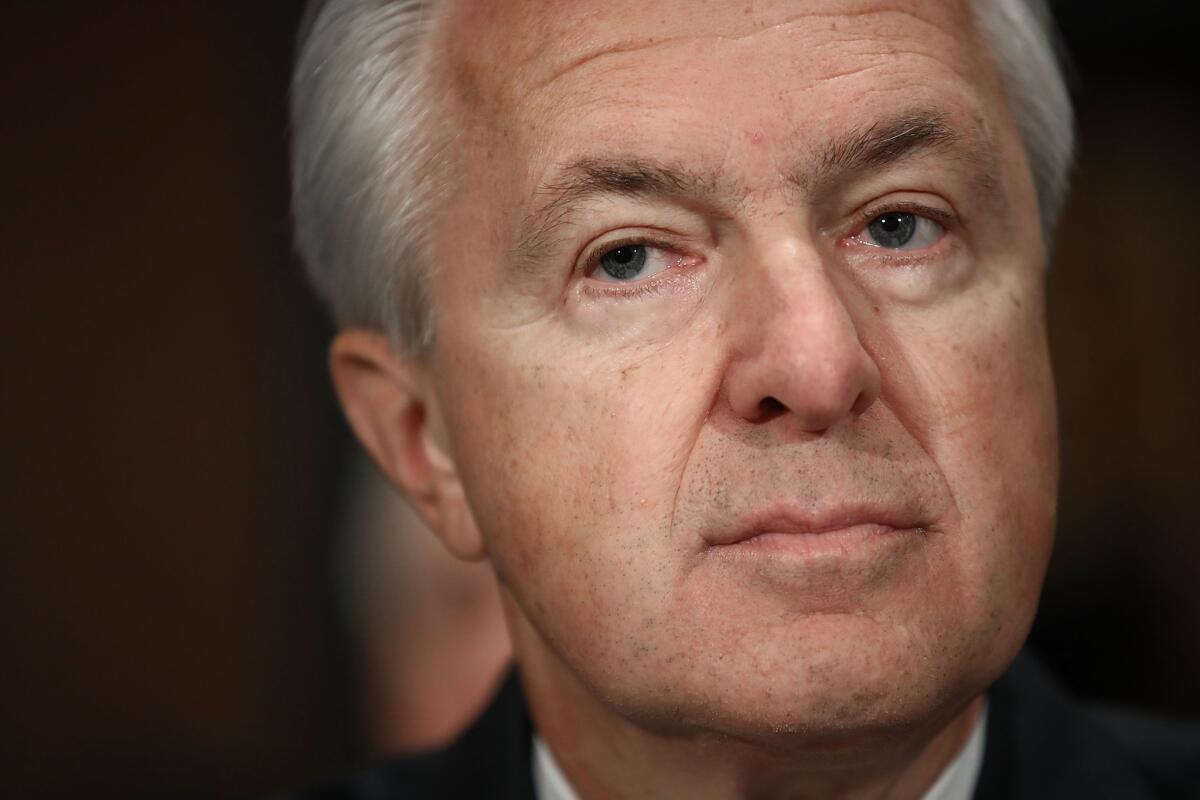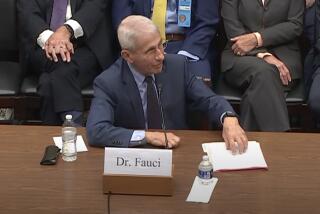Wells Fargo CEO faces bipartisan wrath during fiery Senate panel hearing

Reporting from Washington — The trouble at Wells Fargo & Co. started small, with a few employees at branches opening bogus accounts as they tried to meet aggressive sales goals and keep their jobs.
Now, after an incendiary hearing during which U.S. senators told the bank’s chief executive he should resign and face criminal charges, it’s morphed into a widening scandal that has at least temporarily united Democrats and Republicans in Washington -- and could spread well beyond Wells Fargo.
Members of the Senate Banking Committee pilloried John Stumpf, CEO and chairman of the San Francisco banking giant, over revelations that thousands of bank workers opened as many as 2 million accounts for customers without their knowledge, all in the name of meeting sales quotas that regulators say encouraged bad behavior.
Republicans and Democrats went after Stumpf in a rare display of bipartisan agreement that underscores the severity of the case against the bank. Its questionable practices were first reported in a 2013 Los Angeles Times article cited several times during the hearing.
“You have done something that has never happened in the last 10 years and united this committee on a major topic -- and not in a good way,” Sen. Jon Tester (D-Mont.) said.
Tester and other members of the committee took Stumpf to task, pushing him to explain how he could have allowed bad practices to go on for years, why the bank has fired 5,300 mostly rank-and-file workers while not cutting the pay of top executives, and whether the bank is doing enough to help its aggrieved customers.
Robert Hockett, a Cornell University law professor who has testified before the Senate Banking Committee, said he was struck by the unbroken barrage of questions thrown at Stumpf by senators.
“That was definitely a first,” Hockett said. “I guess we ought to congratulate John Stumpf on that one. He really did what seemed to be impossible.”
Some of the fiercest comments came from Elizabeth Warren (D-Mass.), known for her stinging criticism of Wall Street.
“You should resign,” Warren said. “You should give back the money you took while this scam was going on, and you should be criminally investigated by the Department of Justice and the Securities and Exchange Commission.”
Stumpf was called to the nearly five-hour hearing after Wells Fargo on Sept. 8 agreed to pay $185 million to settle a lawsuit from the Los Angeles city attorney’s office and to end investigations by the Consumer Financial Protection Bureau and another federal bank regulator.
But the deal with regulators has done nothing to settle the bank’s issues.
Members of the House Financial Services Committee have called for hearings of their own into Wells Fargo’s sales practices amid an investigation by federal prosecutors in New York and California. Also, Sen. David Vitter (R-La.) on Tuesday called for regulators to look into whether the bank’s practices have harmed small-business owners. Wells Fargo is a major provider of government-backed Small Business Assn. loans.
What’s more, the head of the Office of the Comptroller of the Currency, a federal bank regulator, said Tuesday that his agency would begin investigating sales practices at other banks in an attempt to determine whether the practice of creating fake accounts to meet sales goals might be more widespread.
“These practices … undermine the fundamental trust that goes to the heart of the bank-customer relationship,” Comptroller of the Currency Thomas Curry said.
Wells Fargo has been singled out for its sales quotas and its focus on so-called cross-selling, which encourages customers to use more of the bank’s products and services, including checking accounts, credit cards and home loans, but quotas and cross-selling are common throughout the industry.
The Office of the Comptroller of the Currency and the consumer agency in their settlements painted a picture of a sales culture at Wells Fargo that pushed employees to meet unrealistic sales goals at any cost. That included opening credit card accounts for customers who never asked for them and creating fake email addresses to sign customers up for online banking.
Sen. Bob Menendez (D-N.J.) called it “despicable” that Wells Fargo has “laid the blame on low-paid retail bank employees” when the company’s culture really was to blame.
Stumpf repeatedly said he took responsibility for the bank’s failure to prevent those practices, but just as many times said that the employees who broke the rules amounted to a tiny fraction of the bank’s workforce.
“The vast majority did it the right way,” Stumpf said.
Sen. Jeff Merkley (D-Ore.) and others, though, chided Stumpf for what they saw as doublespeak.
“All you say is, ‘I accept responsibility, and by the way it’s the fault of those 5,000 people who just weren’t ethical enough,’” Merkley said. “That’s not accepting responsibility. You are scapegoating the people at the very bottom.”
Senators also went after Stumpf for apparently not keeping close tabs on the bank’s operations. Several senators questioned Stumpf about when he first found out that employees had been creating fake accounts, and Stumpf repeatedly said he did not know until 2013.
But Vitter pointed out that Wells Fargo in 2011 fired about 1,000 workers for those practices and said it was troubling that Stumpf did not know about the scandal until two years later.
“This is crystal-clear proof that an entity the size of Wells is not only too big to fail, but too big to manage,” Vitter said.
A key issue at Tuesday’s hearing was whether Stumpf believed Wells Fargo should rescind some of the compensation owed to Stumpf and Carrie Tolstedt, the longtime executive who ran the bank’s consumer banking unit that oversaw many of the sales practices.
Sen. Bob Corker (R-Tenn.) said it would amount to “malpractice” if Wells Fargo did not dock some of Tolstedt’s pay.
But Stumpf said he was “not an expert in compensation” and would leave any decision about Tolstedt to a committee on Wells Fargo’s board.
Tolstedt announced her retirement in July after amassing salary, bonuses, stock, options and other compensation totaling $124.6 million in her career, Fortune reported, although others placed the figure in the mid-$90-million range.
Stumpf acknowledged Tuesday that Tolstedt’s retirement, announced over the summer, was motivated by the fake accounts scandal but defended the decision to allow her to retire rather that fire her.
Stumpf did offer senators some information about how the bank will deal with fake accounts and try to prevent problems in the future.
The bank will now review accounts going back to 2009, two years beyond what it agreed to in the settlement.
The bank will also contact customers and ask them to visit a Wells Fargo branch or call a hotline to go over their accounts. The bank had committed to take those steps for California customers but will now do so nationwide.
Beyond that, little new information came out of Tuesday’s hearing, with Stumpf promising to get back to senators with more answers, including how the bank might compensate customers whose credit scores were hurt by the bank’s practices or workers who were fired for not meeting aggressive sales quotas.
Though a rough day for Stumpf, Tuesday’s hearing could be a victory for critics of the banking industry amid attempts by Republican lawmakers to weaken the Consumer Financial Protection Bureau and water down other rules created in the wake of the financial crisis.
“This case is about protecting ordinary, middle-class Americans. It’s almost a godsend for the CFPB,” said Hockett, the Cornell professor. “You’re talking about garden-variety banking products that are offered to ordinary folks -- people from the ‘Andy Griffith show.’ ”
Puzzanghera reported from Washington.Peltz and Koren reported from Los Angeles.
ALSO
Which fast-food chains served the meat, held the antibiotics?
Protests filed over PG&E plan to shut down Diablo Canyon nuclear plant
U.S. guidelines on driverless cars offer some direction on future policy
UPDATES:
6:40 p.m.: This article has been updated throughout with additional information.
1:50 p.m.: This article was updated with Wells Fargo’s share price.
12:45 p.m.: This article has been updated with comments from Comptroller of the Currency Thomas Curry.
12:20 p.m.: This article has been updated with comments from Ed Mierzwinski of the U.S. Public Interest Research Group.
This article originally was published at 11:30 a.m.
More to Read
Inside the business of entertainment
The Wide Shot brings you news, analysis and insights on everything from streaming wars to production — and what it all means for the future.
You may occasionally receive promotional content from the Los Angeles Times.













